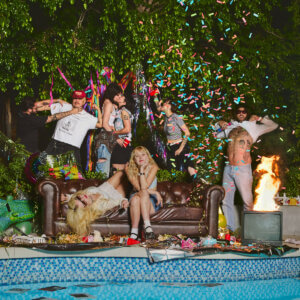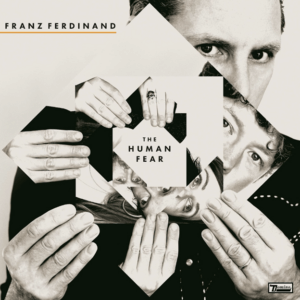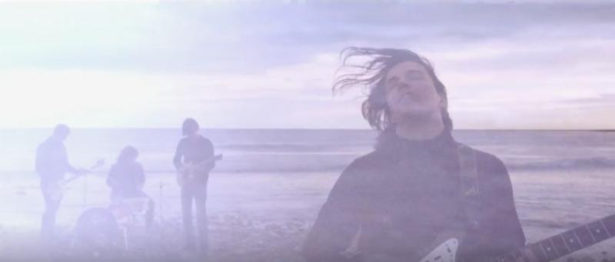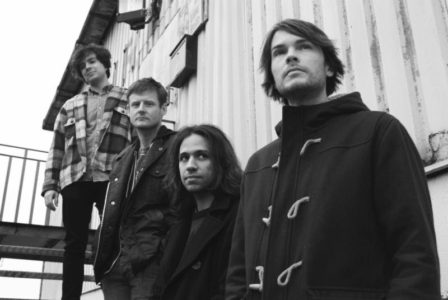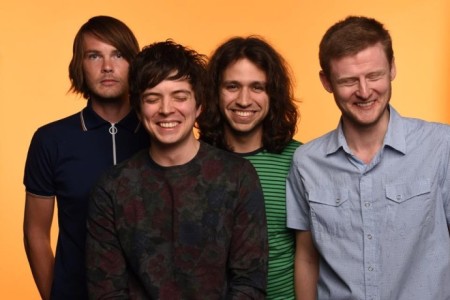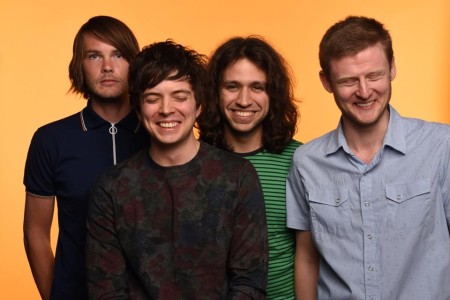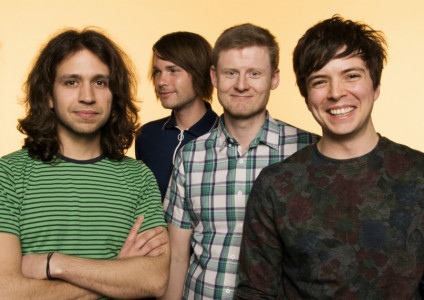Our Interview with Jon from Lull
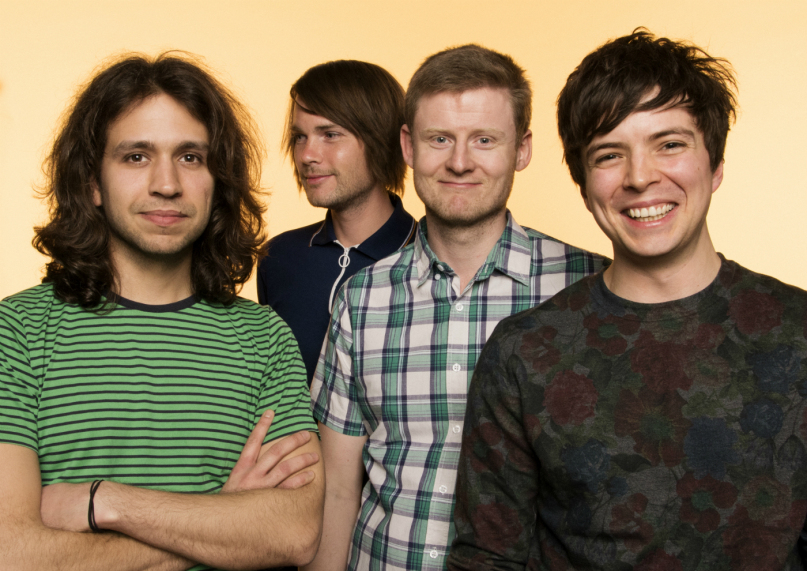
From the moment “Bubble Tea” comes soaring through the speakers, flooding the room with layers of sound, it’s clear that the self-titled debut EP from London newcomers Lull is something special. Lull isn’t riding a shoegaze wave, they’re generating it. Like a massive storm out to sea, their sound is a mixture of commanding tension and watery melancholy, pierced through with the flashes of blistering, swirling guitar, and anchored by a powerful, crashing drum sound. Toby, Jon, Filipe, and Simon, who came together by complete chance to form Lull, demonstrate their mastery of melodic reverberation. The band complete each other, their heady music forming a signature sillage, like a scented trail left by a fragrance, or a wake left on the water, leaving no doubt this is a debut to watch. Out in North America on PaperCup Music, the EP has been getting a lot of love over here. Northern Transmissions was able to catch up with the band in London. Alice Severin talked with songwriter and guitarist Jon about influences, style, and substance.
Northern Transmissions: How are you and where are you?
Jon: Yeah, I’m doing great. I’m in Spitalfields in London, in East London where I work. And yeah, just about to decide whether to get a baguette or something a bit more bourgeois. (laughs)
NT: Are you still based in North London, all of you?
J: Yeah, so the majority of us live in North London. Yeah, we all live sort of north London. It’s actually quite remarkable that we were this close.
NT: So the EP’s come out in June, and you’ve been playing gigs. How’s it been going?
J: Yeah, most of the shows that we’ve been playing have been in London. We played one show in Portugal, because our drummer Filipe is from Portugal. So it was quite easy to get this gig hooked up, which was an amazingly hot experience. Honestly, I think it was like the hottest show we’ve ever played – it was crazy. Mostly, it’s just been London shows for now. We’ve been speaking with some friends to try and do a more regional tour of the UK, places like Manchester and Sheffield and that sort of thing.
NT: That would be really great.
J: Yeah, it would be good to get out of London for a bit. I’m from Manchester originally, and I really, really want get back there and play some shows, definitely.
NT: How long have you been in London?
J: I’ve been in London, probably, god, maybe like about nine years. I came for university. But the rest of the guys, I think Toby is from Reading, Simon is a bit more London based and Filipe came from Portugal. So, it’s quite a spread.
NT: Apparently you all met through musicians wanted ads?
J: Oh god, yeah. (laughs) This is the hardest thing to describe in an interview, because once you get started it ends up just sounding like a lonely hearts advert or something. I guess it kind of was really, I mean I didn’t put out that I was looking for three men or anything like that, but I guess… It was through Gumtree, which I guess is a bit like Craigslist. So I think myself, and Toby, the other guitarist, had been putting up adverts for a while. Something noise-y, something shoegaze-y, whatever have you. And yeah, the response rate was pretty low to start. But it’s always been quite hard trying to start a band for this specific sort of thing, I’ve always found anyway. So, we met up with a few people, and nothing really worked out. We ended up playing together, but the drummer wasn’t really keen on the sort of sound we were having. So he left. And then, just naturally, Simon and Filipe saw the ad, and joined together. It was just bizarre that we all seemed to live so close together without even actually having met. But we had this connection through music. It was quite special.
NT: What did it feel like when you all first played together? Did you think to yourself, ok this is it, this is a good combination?
J: It was like having a musical soulmate, yeah. (laughs) As soon as we played with Simon, we knew it was right. And as soon as we played with Filipe, we knew it was right. They each brought a certain something that was missing before. Because I wrote most of the songs on the EP. But in a previous incarnation they were quite, you know, introspective. Things that not that many people would probably want to listen to. (laughs) Everything just became a lot heavier and more melodic. The coming together of a lot of things to make something that I thought was special – even wider and more interesting.
NT: I always think it’s got to be so tricky, because it’s such a personal thing to make music, and then to introduce new people to the mix.
J: Yeah, of course. I know that if I’d carried on, and done it as my own sort of project, a sort of tyrannical thing of recruiting musicians to just play this part, it wouldn’t have turned out as commercial with as wide an appeal as it has. It’s just more interesting to play as well. I mean, I could imagine being bored a lot quicker with my original compositions, going out and playing them live like we are now.
NT: So you were after that sound initially, but then it expanded. Because it’s quite an interesting sound. It is a bit shoegaze-y but at the same time…
J: Yeah, yeah, it’s super interesting. We’ve been trying for ages to categorize it, not to say it’s like a new brand of music or anything like that, but I think Toby sort of coined a term referring to it as sort of “noise pop” I guess? The things I always start out with are like basic sort of shoegaze, drown in the noise type thing. But I think Toby is into a lot more US indie rock sort of things that are just a lot more clearly rhythmically structured. He sort of brought the pop balance to it. But I think that my insistence on there being this drowning pool of noise gave us that combination, gave us that signature “noise pop” sound, I guess? (laughs)
NT: I almost wanted to describe it as shoegaze meets early Foo Fighters, in a way.
J: Oh yeah, yeah. That’s a good point. A really good point. Yeah, a lot of the comparisons we get have sort of been like early sort of poppy rock sort of bands like Pavement and Dinosaur Jr. and stuff like that, but then there is that sort of slightly more surreal thing in the music I guess.
NT: Did you have other influences?
J: Yeah, totally. Trying to think of other bands. I used to listen to a lot of Emo and Screamo before the term got kind of bastardized. The more pop punky stuff. Anomie as well is an incredible French punk band that are screamo as well, that…just these really bizarre chord voicings that had a massive, massive effect on everything that I do. And to put them into shoegaze…I don’t know. It just comes up with this completely unique sound which I never really heard before. I mean, I had visions that I was going to be in a screamo band back in the day, but that never really materialized. That was even harder to source members for than shoegaze appears to be. (laughs) No idea why.
NT: That’s great because it sounds like you’ve got lots of ideas yet to explore.
J: Yeah yeah yeah. It’s really early days and we’re getting a lot of love from America and Canada. So perhaps there’s this untapped seam we don’t know about and we should be playing shows there instead of here. (laughs)
NT: Shoegaze has had quite a resurgence, it seems.
J: Yeah, it has here as well, but it’s quite, you know, that sort of psych rock thing, like Tame Impala. It’s all that sort of thing around here. That’s great, but for our sort of thing, it has that sort of American heavy influence.
NT: What about the guitar sound, which is just brilliant. What do you play and do you have a favorite set up or amp?
J: Yeah, I mean, I think when I properly started getting into playing this sort of music, I mean like the typical person that goes into it, that was me. You have to buy a Fender Jaguar or Jazzmaster and get the long tremolo arm and practice all the glide-y sort of chord shapes, and things like that. Which I did for a while. So yeah, I use a Fender Jaguar, and a lot of my playing is quite treble heavy, which kind of combines quite well with Toby’s style as well. Because when you hear it on record, the higher scrapey sort of sound is always me, and the sort of low end bass driving sort of guitar usually comes from Toby’s side of things, you have this sort of rock thing going on. But yeah, what else do I use? My amp is an Orange, which…I mean, I tried out Marshalls for a while. I don’t know. The Marshall had this clarity which I really liked, but as soon as I tried out this Orange, it had that, and then also the option to go full tilt and do sort of like an extremely reverb heavy – it’s like a reverb something model. But it just this insane level of up to 11 or something reverb ridiculous. And yeah, as far as like pedals go, I think a lot of the stuff on the EP, my sound was using, surprisingly, like a Big Muff, and just trying to make it more suitably treble-y for my liking. Which was mostly done in the studio, such a thick sound to cope with. But yeah, aside from that, we actually are quite sparse in our use of pedals. We don’t actually use that much. It’s really just the contrast with different styles of distortion, and I suppose reverb. We’ve started writing a lot of our new stuff that introduces phasers and chorus pedals and that sort of thing. And Toby actually uses a lot of delay as well.
NT: What was the recording like? Did it happen very quickly?
J: Yeah, the process was pretty quick. We had the good fortune that a friend of ours could record the guitars and vocals at his home studio. And we were really happy with the sound that we got from that because we could have spent a lot more money and a lot more time on something. He does production as well and he had the perfectionist streak, the professionalism, the perfectionism you really need to drive along. I think it was about two or two and half days that we recorded it, so. I mean, that was guitars and vocals. We prerecorded bass and drums at a different studio in London. And we’ve used different studios to record individual tracks for some upcoming stuff. But yeah, really – it was really surprising to get it done so quickly.
NT: Every song has a slightly different feel, but retains the band’s individual sound.
J: Yeah, I think that’s something we wanted to go for.
NT: There’s a repeated guitar riff at the end of “Diving”. You’ve got these little moments throughout all the songs which are like great little memories to hold on to.
J: Yeah, thank you. That’s a really nice way of putting it. Yeah, like little motifs, I guess. “Diving” is probably the one that easiest to pick that apart, where it’s kind of…I always think it has this sort of motif of the ocean, and stuff. I mean the lyrics are all, I suppose, inspired by like…you know “The Owl and the Pussycat”? Where they sort of sail out to sea. Although I think the actual child’s tale is a lot simpler and less revolving around death? (laughs) But like you say, these motifs, Toby’s there doing his delay thing and it kind of sounded like a siren being washed away at sea, and that sort of thing. We tried to add that to the music. That was originally an acoustic song by me. It went from being nothing, to being something quite special I think.
NT: So are you working on material for an album or just writing more songs? Are you thinking about releasing a full-length album?
J: I think that eventually, we’re going to release a full length. It’ll probably have a few of the songs from the EP. And some of these new ones that we’re doing at the moment. I think for the time being we’re building up a sort of roster of about, I think, four more songs that we have practically ready to go. And we’re just kind of deciding right now how to distribute them. I mean it may come out as another EP, or we may do it as a single with a B side, or maybe just singles, individually on line or something like that. We haven’t really decided yet. But very soon, things will happen.
NT: Have you got any plans to tour over here in North America?
J: We wish. Yeah. We are looking to do that, definitely. We signed to a European label, and a US label, Paper Cup Records in America. So yeah, we are absolutely 100% looking for shows in the US, in Canada, abroad, anywhere we can get our hands on, really. But we’re still pretty early on in our band career. So we’re still really building up a sort of base here. But yeah, please invite us over right now. (laughs)
NT: There’s CMJ and SXSW.
J: Yeah, yeah, that would be absolutely incredible. Even just playing smaller shows in the US would be fantastic, off the back of other bands. Yeah.
NT: And five albums that you return to.
J: Let me think. I think, I’m really into a lot of the old 4AD stuff? Dead Can Dance. Back in the day, you know it was like Cocteau Twins and This Mortal Coil. This Mortal Coil, I think anything by them. So things like Blood, one of my favorite albums ever. Just anything by them. I think their approach, like this collaboration of artists, it’s transporting, meditative music, I think. And I think that comes through a lot when I’m writing songs. Trying to sort of create this, another word I hate, ethereal sort of soundscape. Without relying on the tropes of the genre, like tremolo, and that sort of thing. But just…I don’t know. This Mortal Coil did use a lot of reverb, didn’t they, and experimentation I guess. So yeah, anything by them.
And label mates as well, Cocteau Twins. Again, I find it so hard to pinpoint anyone, but I’m a bit of a fanboy about them.
And yeah, of course, My Bloody Valentine. I’d probably pick Isn’t Anything. I mean, Loveless is incredible as well, but I think Isn’t Anything is one of the most timeless albums to me. There’s bits of instrumentation that I think stay with you forever. Like their sad song, “No More Sorry”, which is just something that Shields does with this acoustic guitar. I don’t know, it sounds like a little stab of dagger-like proportions which gives you shivers.
New stuff. There’s a guy called Dean Blunt that kind of does shoegaze-y and sometimes like poppish rap stuff. But bizarrely, yeah his tracks are quite closely related to This Mortal Coil in the experimental sense. I’m just – I think any music that’s sort of challenging and a bit weird, I really enjoy.
And yeah, I think a classic would just have to be, At the Drive-In, Relationship of Command. I think that they have another earlier album called Acrobatic Tenement, which is a slightly more punky, terribly recorded one, (laughs), which is probably my favorite, but I have to take Relationship of Command purely because, I think around the time I was learning guitar, it was the album that sort of taught me all these bizarre chord voicings and different ways to approach the guitar. And I never really had lessons for a very long time, so learning in a slightly more freeform way that it didn’t matter if you were playing things slightly incorrectly.
Alice Severin
Latest Reviews
Tracks
Advertisement
Looking for something new to listen to?
Sign up to our all-new newsletter for top-notch reviews, news, videos and playlists.
